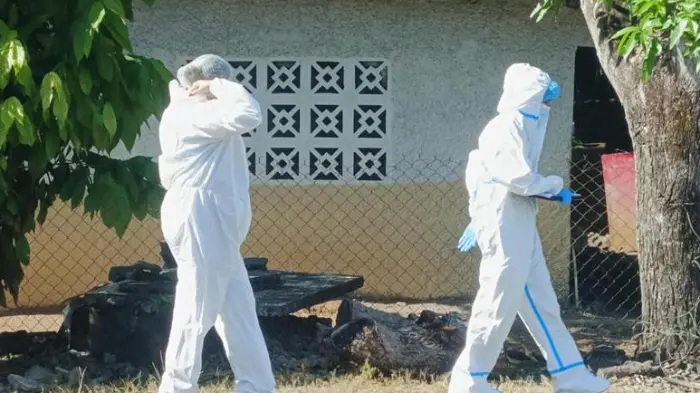WHAT THE PAPERS SAY: Two Middle East countries want war with Iran

Panama, once the refuge of the deposed Shah of Iran is a firm supporter of Israel in the United Nations General Assembly so what the U.S. does in the Middle East can have implications right here, making the latest Iranian crisis worth following.

Outspoken First Post columnist, Andrew Cockburn, a “Brit” living in California has this to say on the latest “scare”:
Even by the forgiving standards of American credulity, the supposed Iranian plot to assassinate the Saudi Ambassador to the US is spectacularly ludicrous. That doesn't mean it isn't a sinister harbinger of a new crisis, possibly war.
Why would Iran want to kill the Saudi envoy – not the colourful and influential Prince Bandar who used to hold the job, but the mild-mannered functionary, Adel al-Jubeir ? To kill any ambassador – particularly a Saudi ambassador – is to invite lethal retaliation, even war. Iran doesn't want war with the US.
Manssor J. Arbabsiar, an Iranian-American used car salesman from Corpus Christi, Texas, has been indicted as the chief conspirator working for Iranian intelligence. He is charged with promising to pay $1.5 million to Los Zetas – one of the Mexican drug cartels – to kill the Saudi ambassador at a restaurant in Washington.
The FBI claims that Arbabsiar told the Drug Enforcement Agency's informant – posing as a high-ranking member of Los Zetas – that it would be "no big deal" if many others died at the restaurant, possibly including United States senators. He also proposed bombing the Israeli embassy.
If even one US senator died in a terrorist bombing in Washington, if anything larger than a firecracker detonated outside the Israeli embassy, US bombers would be raining high explosive on Iranian targets within 24 hours. Why would Iran want to invite such a response?
The supposed plot is wreathed in incidental grandiose absurdities: a side deal between the Quds Force, part of Iran's Islamic Revolutionary Guards Corps (IRGC), and Los Zetas to smuggle vast shipments of opium from the Middle East to Mexico, and plans to bomb the Saudi and Israeli Embassies in Argentina.
To repeat: Iran doesn't want war with the US. Quite the reverse. President Mahmoud Ahmadinejad recently tried to refloat the Tehran Research Reactor nuclear fuel swap. He proposed that Iran suspend production of some uranium-enrichment activities in exchange for fuel supplies from the United States. On 29 September the International Herald Tribune ran an oped piece saying the proposal was well worth consideration by the US government. All such hopes of a warming in relations have now been snuffed out.
There are two powers in the Middle East that most certainly do want war, or a deepening rift between the US and Iran – namely Saudi Arabia and Israel.
Iranian intelligence is famously efficient at hiding its tracks. Though many believe that it was the Iranians who blew up PanAm flight 103 in 1988 – in retaliation for the downing of an Iranian civilian airliner by the US Navy ship, the Vincennes – no convincing trail has ever come to light. Yet it is supposedly Iranian intelligence that wired $100,000 to the used car salesman, using a known Quds bank account.
If the bid was a false flag operation mounted by the Saudis or Israelis, an open transfer of money would be one obvious tactic.
The US has made swift use of dubious "plots" in the not-so-distant past. In 1981 it flourished charges of a Libyan "hit squad" entering the US through the border tunnel between the Canadian town of Windsor to Detroit, with a plan to assassinate newly elected President Ronald Reagan. No evidence was ever offered for this but it kindled animosities that culminated five years later with the US raid on Tripoli, aiming to assassinate Col Gaddafi in his compound.
In April 1993, former president G.H.W. Bush was visiting Kuwait to commemorate the victory over Saddam in the Gulf War. Detection by the Kuwaitis of a plot to kill him with a car bomb was announced. The FBI duly declared that the wiring of the bomb indicated that the bomb-makers belonged to Iraqi intelligence.
In June 1993 Madeleine Albright, US ambassador to the UN, denounced the plot in the Security Council and a day later President Clinton ordered the firing of 23 Tomahawk cruise missiles at the HQ of Iraqi intelligence in Baghdad. One of the missiles landed in a Baghdad suburb and killed Layla al-Attar, one of Iraq's leading artists. This set the tone for relations during the Clinton years.
There have also been some spectacular cases of gullibility on the part of supposedly seasoned US intelligence operatives and high military commanders.
A year ago General Petraeus and the US high command in Afghanistan placed great confidence in Mullah Akhtar Muhammad Mansour, allegedly a senior Taliban commander empowered to make peace proposals. The US negotiators and Afghan officials were initially suspicious of Mansour's credentials but their doubts soon melted. According to a New York Times report, "Several steps were taken to establish the man's real identity; after the first meeting, photos of him were shown to Taliban detainees who were believed to know Mr. Mansour. They signed off, the Afghan leader said."
It turned out that Mansour, given quite large sums of money by the Americans, was a freelance impostor. Please note that in the case of the Iranian plot, the FBI says that Manssor J. Arbabsiar correctly identified a known Quds Force officer from a photo array.
The question is why the US government should nail its colours so firmly to the mast of this purported Iranian assassination plot. On two other occasions the US made passionate commitments at the UN to concocted evidence – with both used as levers to launch wars.
The first was US Secretary of State Colin Powell's unveiling to the UN in February of 2003 of the infamous dossier of entirely bogus evidence that Iraq had a huge arsenal of weapons of mass destruction. The second was the allegation by Secretary of State Hillary Clinton, and US ambassador to the UN Susan Rice, in February of this year, that Gaddafi was committing crimes against humanity up to and including genocide against his own people – charges decisively refuted by Amnesty International and Human Rights Watch.
Absurdity is not a decisive factor. Iran doesn't want war with the US. But how far will the US go in its response, led as it is by a weak president always glancing fearfully over his shoulder at the neo-cons and the war party.





